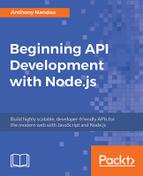We have already looked at how local modules are loaded from the previous example that had math.js and index.js.
Since JavaScript Object Notation (JSON) is such an important part of the web, Node.js has fully embraced it as a data format, even locally. You can load a JSON object from the local filesystem the same way you load a JavaScript module. During the module loading sequence, whenever a file.js is not found, Node.js looks for a file.json.
See the example files in lesson-1/b-module-system/1-basics/load-json.js:
const config = require('./config/sample');
console.log(config.foo); // bar
Here, you will notice that once required, the JSON file is transformed into a JavaScript object implicitly. Other languages will have you read the file and perhaps use a different mechanism to convert the content into a data structure such as a map, a dictionary, and so on.
When you run npm install, without specifying the module to install, npm will install the list of packages specified (under dependencies and devDependencies in the package.json file in your project). If package.json does not exist, it will give an error indicating that no such file has been found.
